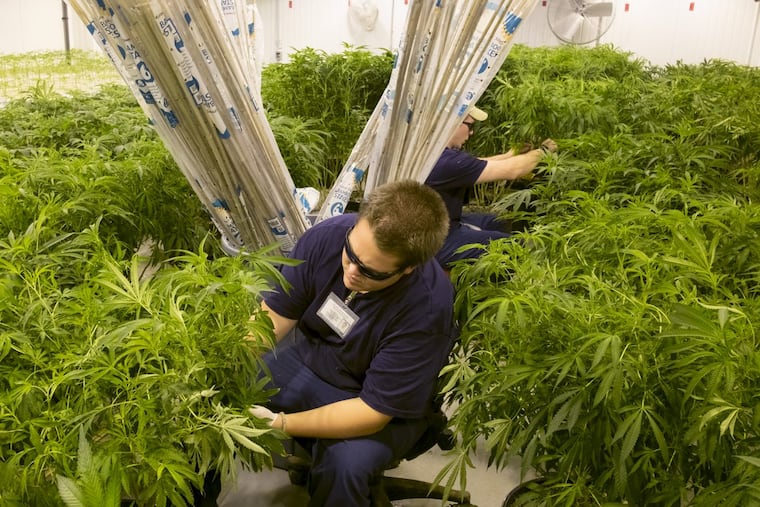'Pent-up demand' for medical marijuana in N.J. boosts enrollment 25 percent
Enrollment in New Jersey's medical marijuana program has spiked 25 percent since Gov. Murphy took office in January. About 20,000 patients now participate, and about 100 more sign up each day. Unlike his predecessor, Chris Christie, Murphy is pro-cannabis and is promoting the use of medical marijuana as an alternative to opioids.

Enrollment in New Jersey's medical marijuana program has jumped 25 percent under Gov. Murphy, who unlike his predecessor, Chris Christie, campaigned on a pro-cannabis platform.
About 20,000 patients now participate, according to a report released Tuesday by Health Commissioner Shereef Elnahal.
In the last 30 days alone, 1,000 new patients joined the program after they became eligible under a greatly expanded list of qualifying medical conditions, the report said. The breakdown: 500 with chronic pain, 400 with anxiety, 90 with migraines, and five with Tourette's syndrome.
The previous list had only about a dozen qualifying conditions, including cancer, multiple sclerosis, epilepsy, and glaucoma. Three times as many ailments were added last month — under the general categories of chronic pain and anxiety — after an advisory panel of doctors, health-care professionals, and pharmaceutical representatives recommended the expansion. At public hearings, patients testified that cannabis had alleviated their ailments.
"We're adding 100 new patients every day," Elnahal said in the report. "This demonstrates that there was pent-up demand. People with chronic pain now have the option of medicinal marijuana instead of opioids, and more than 100 strains are available."
Since Murphy took office in January, 4,200 more patients have sought medical marijuana.
New Jersey's program began eight years ago, but Christie vowed to veto any expansion and said he viewed it as a backdoor to legalization. His administration created restrictive regulations, many of which are being overturned under Murphy.
Several bills that would legalize marijuana have been introduced but have not yet come up for a vote. Some legislators have said they want to gather public input first and have scheduled several hearings around the state.
Murphy said he would sign a legalization bill when it reaches his desk, but in the meantime he said he wanted to improve the medical marijuana program and also increase access for more patients.
Currently, only five of the six dispensaries that were approved to sell medical marijuana, statewide, are open. There are two in South Jersey — one in Bellmawr, in Camden County, and one in Egg Harbor Township, near Atlantic City.
To accommodate the increased demand, the Health Department will allow the nonprofits that operate these dispensaries to open satellite retail sites and cultivation centers. The Bellmawr dispensary recently became the first to obtain approval to expand its operation at its current location. Last year, the department's comprehensive state report on the marijuana program named the Compassionate Sciences Alternative Treatment Center in Bellmawr as the busiest dispensary.
Among other changes Murphy has announced is the elimination of the requirement that physicians appear on an online registry that can be viewed by the public if they participate in the marijuana program. Some doctors have said they were reluctant to recommend cannabis for their patients because of a perceived stigma of appearing on such a list, Murphy said.
"The program is more patient-friendly and streamlined for physicians," Jeff Brown, an assistant commissioner with the program, said in a recent interview.
Currently, 600 physicians participate in the program, including 50 who joined during the last month. Doctors still have to register with the program and verify their medical licenses before they can certify a patient to use marijuana, Brown said. But under proposed rule changes that could go into effect next year, doctors would be able to skip the registration step, and verify their licenses at the same time they issue a marijuana recommendation for a patient, he said.
The Health Department also plans to launch a $50,000 public awareness campaign to inform patients and doctors of the changes. It will also suggest that patients and doctors consider cannabis "as an important medical therapy to relieve pain" and as an alternative to addictive opioids. This information will be disseminated on social media, radio, and on websites.